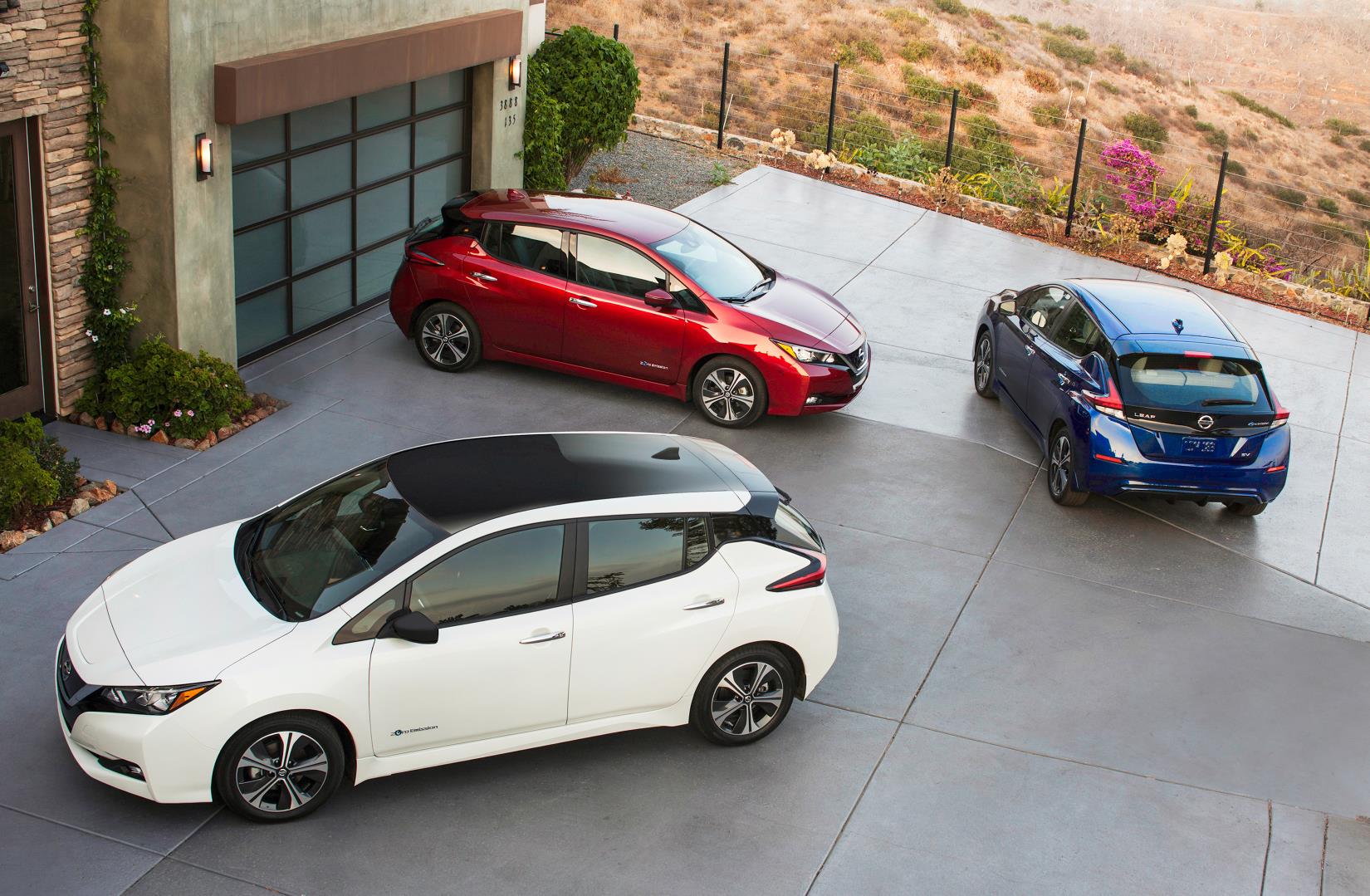2018 Nissan Leaf makes North American Debut
; Date: September 6, 2017
Tags: Nissan »»»» Electric Cars »»»» Nissan Leaf

- 2018 LEAF EV features all-new design and improved driving range
- Starting price announced at $29,990 – $690 below current 2017 LEAF starting MSRP
- New aerodynamic exterior design follows Nissan's signature design language; roomy "cool tech" interior offers advanced telematics systems
- Advanced Nissan Intelligent Mobility technology includes ProPILOT™ Assist, e-Pedal and Safety Shield technologies
- U.S. on-sale date set for early 2018, available at launch in all 50 states
LAS VEGAS – As the global leader in electric vehicle sales, Nissan today continues its pursuit toward a clean-energy future with the reveal of the all-new Nissan LEAF. José Muñoz, Chief Performance Officer, Nissan Motor Co., Ltd. and Chairman, Nissan North America, Inc., unveiled the 2018 Nissan LEAF at a media event at Las Vegas' Thomas & Mack Center. The debut immediately followed the LEAF's global launch in Tokyo, Japan. The next-generation of LEAF, the world's best-selling affordable, mass-production electric vehicle, goes on sale at Nissan dealers in all 50 states in early 2018.
"When we launched LEAF in 2010, it instantly became the most affordable, mass market EV in the world. We are not walking away from that proposition," said Muñoz. "The value equation for the new LEAF is even stronger than ever before – beginning with a starting MSRP1 under $30,000. That's a lower price than the LEAF in market today and it includes more power, range and technology, all wrapped in a beautiful new exterior and interior design."
The new 2018 LEAF features a 150-mile driving range, aerodynamic exterior, roomy high tech interior and advanced technologies including ProPILOT™ Assist and e-Pedal. It is the first step in the re-launch of Nissan's EV platform and will be followed in model year 2019 with a high-power version with increased motor power and battery capacity.
"This new LEAF is not just the latest symbol of Nissan's global leadership in the EV segment, it is the culmination of everything we've learned from more than two billion miles of real life, on-road driving and from the feedback of hundreds of thousands of owners around the world, particularly LEAF customers here in the U.S.," added Muñoz.
To date, Nissan has sold over 112,000 LEAF EVs in the United States and more than 283,000 globally.
The new LEAF is also the embodiment of Nissan Intelligent Mobility, a global initiative that focuses on how Nissan vehicles are driven, powered and integrated into society. Its new ProPILOT Assist (Nissan's advanced single lane driver assistance technology), helps ease driver workload by reducing the amount of driver acceleration, steering and braking input under certain driving conditions. While it is a "hands-on" system, it previews Nissan's ongoing development of future leading edge autonomous drive technologies.
The LEAF's revolutionary e-Pedal technology transforms the driving experience. It lets drivers start, accelerate, decelerate and stop by increasing or decreasing the pressure applied to the accelerator. When the accelerator is fully released, regenerative and friction brakes are applied automatically, bringing the LEAF to a complete stop. The car holds its position, even on uphill slopes, until the accelerator is pressed again. The reactiveness of e-Pedal helps maximize driving pleasure.
"We believe the new LEAF will be another game changer for Nissan in the U.S., just as the redesigned Rogue has been in the last year and a half, hitting the 'sweet spot' in the growing EV segment," said Muñoz. "It takes everything we've learned from our loyal first-generation LEAF owners to the next level."
The new-generation Nissan LEAF will begin making its first public appearances next week at National Drive Electric Week events in eight U.S. cities. Nissan LEAF is the official sponsor of National Drive Electric Week for the third straight year.
For more information on the 2018 LEAF and the complete Nissan vehicle lineup, please visit
nissannews.com.
About Nissan North America
In North America, Nissan's operations include automotive styling, engineering, consumer and corporate financing, sales and marketing, distribution and manufacturing. Nissan is dedicated to improving the environment under the Nissan Green Program and has been recognized annually by the U.S. Environmental Protection Agency as an ENERGY STAR® Partner of the Year since 2010. More information on Nissan in North America and the complete line of Nissan and INFINITI vehicles can be found online at
www.nissanusa.com and www.infinitiusa.com, or visit the U.S. media sites
nissannews.com and infinitinews.com.
About Nissan Motor Co., Ltd.
Nissan is a global full-line vehicle manufacturer that sells more than 60 models under the Nissan, INFINITI and Datsun brands. In fiscal year 2016, the company sold 5.63 million vehicles globally, generating revenue of 11.72 trillion yen. Nissan engineers, manufactures and markets the world's best-selling all-electric vehicle in history, the Nissan LEAF. Nissan's global headquarters in Yokohama, Japan, manages operations in six regions: Asia & Oceania; Africa, Middle East & India; China; Europe; Latin America; and North America. Nissan has a global workforce of 247,500 and has been partnered with French manufacturer Renault under the Renault-Nissan Alliance since 1999. In 2016, Nissan acquired a 34 percent stake in Mitsubishi Motors, which became the third member of the Alliance – a grouping with combined annual sales of almost 10 million units a year.
For more information about our products, services and commitment to sustainable mobility, visit
Nissan-Global.com. Follow us on Facebook, Instagram, Twitter and LinkedIn, and view our latest videos on YouTube.

